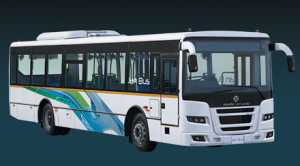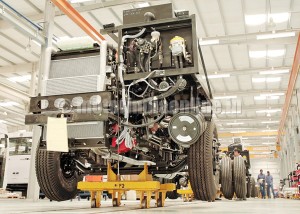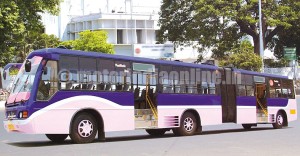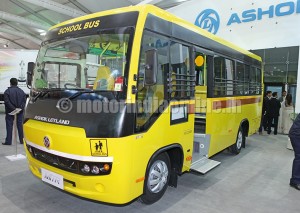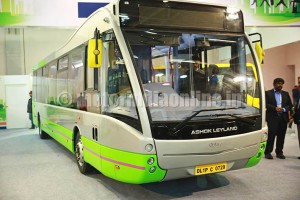The Indian bus industry is the second largest in the world in terms of volumes, clocking close to 100,000 units every year, next only to China. Ashok Leyland (AL) has been at the forefront of the bus industry for decades, driven by innovative products suitable for a wide range of applications, designed and developed with an excellent understanding of the customers and local market conditions. While the JanBus has been the headline-maker in the company’s bus business in recent times, there are many other interesting developments in progress. We spoke to Mr. T. Venkataraman, Sr. Vice President, Global Buses, Ashok Leyland, to get a detailed update on AL’s bus business and how it plans to retain its lead in the market.
With the commercial vehicle industry crawling its way out of the over two-year long recession, the bus segment is yet to hit full throttle though there are initial signs of recovery. Says Mr. Venkataraman: “The bus market is slowly but surely coming back on track. The industry is yet to completely come out of the recession but in certain segments and seasons we have seen some peaks and troughs in sales volumes. We are at least 16 to 17 per cent down on the overall TIV.”
The JnNurm phase II was one of the key growth drivers in the city bus segment in 2014. The Ministry of Urban Development (MoUD)’s vision to have a standard bus platform across the country based on the Urban Bus Specifications-II (UBS-II) is driving the growth of not just fully-built buses but also vehicles with advanced features when it comes to safety, comfort, and connectivity. AL has been the first choice of many STUs for their city bus applications and the recent round of JnNurm reiterated the same.
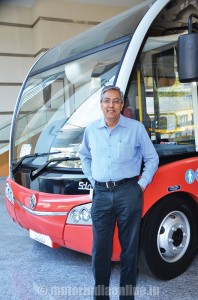
“We have bagged a lion’s share of the orders under JnNurm phase II with about 60 per cent of the total number. We have got an order for 3,894 buses and have delivered more than 1,000 buses and by the end of current fiscal we would have delivered nearly 2,000 buses, which is close to 50 per cent , though logically 100 per cent should have be done. Because of the elections and other delays, the funds have not started plying in, so the execution is quite slow. From April 2015, the new bus code comes into play, so there is uncertainty as to who would pay for the extra costs involved. We have a lot of meetings happening and we are in discussions with the STUs on this issue”, he explains.
While AL has started deliveries to STUs in Kolkata, Assam, parts of Maharashtra and Kerala, one of the most active STUs in the country, Metropolitan Transport Corporation (MTC) of Tamil Nadu did not participate in the JnNurm tender this time around, which comes as a big surprise.
Products that fit
Out of AL’s JnNurm II order, almost 1,800 to 1,900 are JanBuses, which goes to indicate the excellent response to its latest demonstration of Indian innovation. The JanBus is the world’s first front engine fully-flat floor bus and comes with four primary patents and another 24 secondary patents. The 650 mm floor height bus has been a big hit among STUs as it offers a host of advantages to the customer while also delivering value to the end consumer.
“The JanBus has been exceedingly well received in the market. It has caught the customer’s fancy and will surely pave the way for other players to come in and take a share from the new position point we have created”, he shares. The vehicle comes is AC and non-AC variants and can be used for tarmac applications as well.
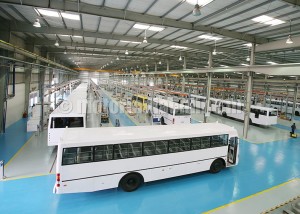
While the JanBus has had a head-start, the JanBus Midi, its smaller version, is likely to take a little longer to gain customer acceptance. With customers in the midi bus segment, primarily for staff and feeder applications, continuing to prefer a 900 mm floor height and the JanBus Midi coming at 650 mm, the shift might gradually happen, mainly driven by need for better comfort and safety.
AL has been launching new products at regular intervals and this has put it is a position to perfectly cater to a wide range of customers for various applications. The Mitr LCV platform has been a key addition to its portfolio. “We are looking at a range of vehicles in the LCV, ICV and MDV segments. On the MDV side the bus can be used for school and other alternative applications. We will be able to offer products starting from 24-seaters all the way up to 70-seaters. We have the Mitr available in 24- and 40-seater variants while we have the Stag and Lynx available in multiple configurations – 2×2, 3×2, 3×3, depending on state-wide requirements. We also have the MDVs – Vikings, Falcons, Cheetahs, etc. So, broadly speaking, we have the whole range from sub-seven-and-half tonne to 16-tonne including the Mitr platform”, he says.
The Tarmac coach segment is one area where AL has a dominant position. It is the clear market leader with more than 90 per cent share in the space. In the luxury intercity segment, AL offers the Luxura which continues to sell in the range of around 10 units per month. The company has held back its plans in this space, as the industry awaits a clear mandate in terms of regulations on sleeper coaches and other aspects in different states. That said, AL is quite clear that it will position itself in the value space within the luxury intercity segment, where it will offer products with features similar to premium players but price them lower to benefit the end customer.
Shift towards fully-built solutions
While most of the advanced bus markets in the world have already moved to OEM-offered fully-built buses, the Indian market is fast catching up in this regard. The country still has a huge share of buses built by body builders in the unorganized sector but the trend is rapidly changing given the rising standards of performance, comfort and safety, with effort in the right direction from various stakeholders including the government, OEMs, component suppliers, customers and the end consumers. The new bus norms which come into force from April this year calls for reduction in NVH levels, standardization of features such as disc brakes, air suspension, AMT or automatic transmission, and many more.
“The change from chassis-body buses to fully-built buses is happening and will be further driven by the new bus code which will make the new buses safer and more comfortable. The entire JnNurm order is for fully-built buses while we have other segments like school buses which have also moved to fully-built solutions. At present, around 37 to 38 per cent of the Indian bus market is catered to by fully-built buses and progressively the figure could be around 60 to 65 per cent by next fiscal”, he says.
Ashok Leyland offers fully-built bus solutions from its plant at Alwar, Rajasthan and also from the Viralimalai facility of Global TVS (formerly Irizar-TVS), near Trichy in Tamil Nadu. Ashok Leyland holds 70 per cent stake in Global TVS with 80 per cent of the latter’s production catering exclusively to Ashok Leyland. The company also works with few hand-picked bus body building partners across the country including leading names in the industry such as Alma Motors, JCBL, Mungi, KMS Coach, MG Auto and Veera Vahana to name some.
AL is working on setting up ‘body repair centres’ in different parts of the country, a move aimed to drive customers towards fully-built bus solutions and support them in the process. “We will be setting up Ashok Leyland body repair centres and are working with our dealers towards the same. We plan to give them economical kits which will help them do the repairs in a structured environment. Where the geography does not lend itself for the dealers to handle the repair, we will either take the help of our accredited body building partners or open separate centres for the same. We might start with, say, 10 outlets and go in a phased manner because it has to be done the right way and be economically viable”, he reveals.
Electric Mobility
On the electric mobility front, AL had recently launched the Optare Versa EV, a zero emission electric vehicle for the Indian market. The company is closely following the government steps towards electric mobility and is confident of good progress in the coming years. “In India, Odisha and Kolkata are looking at electric vehicles and globally we have had interest from customers in Dubai and Qatar. We have already received an order for 31 Optare EVs from Bahrain. We have demonstrated our capabilities in this segment and believe we have exciting times ahead”, he quips.
AL has been going strong on exports in recent years, expanding its reach and customer base across various markets globally. In addition to exporting a good number of buses to the SAARC region, it has penetrated into markets like Congo, Senegal and other African countries, with regions like Middle East, North America, CIS, Latin America and ASEAN region opening up as well. Almost 45 per cent of AL total bus production each year is exported.
With a robust strategy built on innovative products, forward-looking approach, strong customer connect and other attributes of a market leader, AL is well positioned to maintain its leadership in the domestic market, driving growth and upping the standards in the Indian bus industry in the process.
Ashok Leyland opens sixth workshop in Riyadh
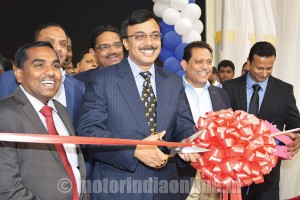
Ashok Leyland opened its sixth state-of-the-art service workshop in Riyadh, Saudi Arabia, on February 18. Mr. Vinod K. Dasari, Managing Director, Ashok Leyland, and its representative from the channel partner Western Auto jointly handed over 150 buses to customers on the occasion.
Speaking on the occasion, Mr. Dasari observed: “Middle East is a very important area of focus for us. Saudi Arabia especially is a big market, and this investment represents our commitment and the importance attached to this market. We have always believed in customer service and satisfaction with a long-term service commitment. This facility will help maintain our leadership position along with Western Auto, and we intend to add three more workshops in the coming year.”
